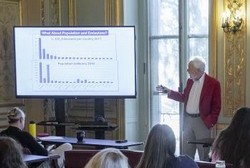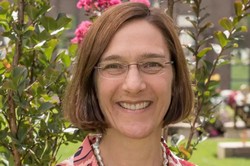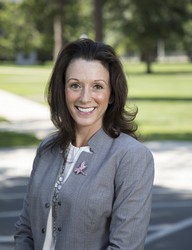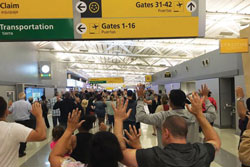The Climate Crisis Teach-In, which allowed students and faculty to ask questions and observe professional lectures regarding the state of climate change, took place within Wilson Hall on Friday, Sept. 20.
Nine speakers presented over a three and a half hour period, relating the issue of climate change to multiple topics ranging from the crisis’ impact on plant communities to real estate. The presenters represented different fields of expertise, including science, sociology, ecology and business.
The Teach-In was live-streamed throughout the entirety of its program, and a light vegetarian lunch was served during brief intermissions between speakers.
Kayla C. Lewis, Ph.D., an Assistant Professor of Physics, gave a lecture, entitled, “Why Climate Models are Trustworthy.” Lewis discussed the accuracy of climate models created decades ago, and how these models reflected a future remarkably similar to the present we live today.
“The model is not some simple thing,” Lewis explained. “It’s this complicated set of equations describing what’s going to happen all over the world. These models did a good job of predicting what would happen in the past. That gives us confidence that they would do a good job predicting what would happen in the future.”
Every lecture was followed by a 10 minute Q&A period for conference attendees before a transition from one speaker to the next.
More than two-dozen listeners filled the room during each presentation, often coming and going during intermissions as each speaker catered to a different type of audience.
Nancy Mezey, Ph.D., Dean of the Honors School and a Professor of Sociology, gave a presentation titled, “Global Capitalism and Anthropogenic Causes of Climate Change.”
“We are, as a society, not simply just a collection of individuals, but rather a collection of people who live an existence and a relationship to one another,” Mezey explains. “Those relationships create the very essence of what is social in our lives.”
With a the massive global implications of the destruction that climate change can bring, many listeners asked personal advice on how change can be made in the day to day life of a university student.
“There’s a lot of things on an individual level we can do,” Mezey said. “I would say collectively what [the students] should do is rally the university and encourage us not to use Styrofoam. Use more recyclables goods, and not to waste food. I would say to the students, look around and see what you find problematic as a system. Is it food waste? Is it wanting more solar on our roofs? I think the larger question is what can do collectively to change systems.”
She continued, “what is healthy and harmful to the planet, and then take action in your daily lives accordingly. It’s the difference anyone can make.”
John Morano, Professor of Journalism and a published environmental-based author, believes that society is overwhelmed by the extent of climate change. “They often defer to the notion, ‘What can I do anyway?’ Well, individuals can, and do, make a difference. First, follow the adage, ‘Think globally, act locally… try to have a sense of what is healthy and harmful to the planet, and then take action accordingly,” Morano said.
PHOTO COURTESY of Monmouth University




